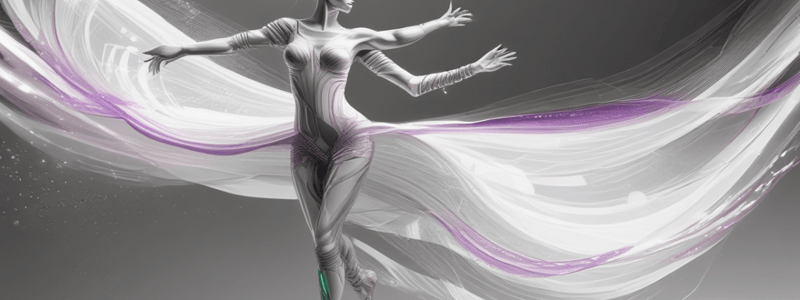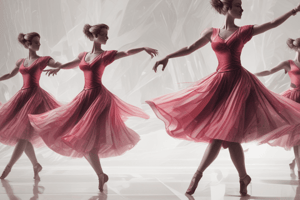Podcast
Questions and Answers
What is the primary purpose of body alignment in dance?
What is the primary purpose of body alignment in dance?
- To promote strength and injury prevention (correct)
- To enhance the aesthetics of a dancer's movements
- To master weight shifts
- To improve a dancer's flexibility
What is the main focus of floor work in dance?
What is the main focus of floor work in dance?
- Developing dynamics and energy
- Mastering weight shifts
- Exploring pathways and levels on the floor (correct)
- Improving flexibility and extension
What is the primary benefit of flexibility and extension in dance?
What is the primary benefit of flexibility and extension in dance?
- Increased range of motion (correct)
- Enhanced body awareness
- Mastering dynamics and energy
- Improved balance and weight shifts
What is the main objective of balance and weight shifts in dance?
What is the main objective of balance and weight shifts in dance?
What is the primary focus of movement in dance?
What is the primary focus of movement in dance?
What is the primary benefit of body awareness in dance?
What is the primary benefit of body awareness in dance?
What is the primary purpose of dynamics and energy in dance?
What is the primary purpose of dynamics and energy in dance?
What is the ultimate goal of understanding movement techniques in dance?
What is the ultimate goal of understanding movement techniques in dance?
What is the main purpose of isolation in dance movements?
What is the main purpose of isolation in dance movements?
What is musicality in dance?
What is musicality in dance?
What is the purpose of traveling steps in dance?
What is the purpose of traveling steps in dance?
What is the result of partnering and contact work in dance?
What is the result of partnering and contact work in dance?
What is the role of improvisation in dance?
What is the role of improvisation in dance?
Why is body awareness important for dancers?
Why is body awareness important for dancers?
What is the result of versatile movement techniques in dance?
What is the result of versatile movement techniques in dance?
What is the significance of articulation in dance?
What is the significance of articulation in dance?
Why do dancers need to develop a keen sense of musicality?
Why do dancers need to develop a keen sense of musicality?
What is the role of choreography in dance?
What is the role of choreography in dance?
Which dance style originated in Hispanic countries?
Which dance style originated in Hispanic countries?
What is a key element of Tap dance?
What is a key element of Tap dance?
What is a characteristic of Ballroom dance?
What is a characteristic of Ballroom dance?
What is Bollywood dance a fusion of?
What is Bollywood dance a fusion of?
What is a key element of Contemporary Ballet?
What is a key element of Contemporary Ballet?
What is Flamenco dance characterized by?
What is Flamenco dance characterized by?
Why is it beneficial to learn multiple dance styles?
Why is it beneficial to learn multiple dance styles?
What is a common aspect of various dance styles?
What is a common aspect of various dance styles?
What do versatile movement techniques provide dancers with?
What do versatile movement techniques provide dancers with?
What is the outcome of training in different movement styles?
What is the outcome of training in different movement styles?
What is the characteristic of jazz dance?
What is the characteristic of jazz dance?
What is the primary focus of contemporary dance?
What is the primary focus of contemporary dance?
What is the origin of hip-hop dance?
What is the origin of hip-hop dance?
What is the result of being a versatile dancer?
What is the result of being a versatile dancer?
What is the benefit of seamlessly transitioning between different movement techniques?
What is the benefit of seamlessly transitioning between different movement techniques?
What is the characteristic of ballet?
What is the characteristic of ballet?
What is the importance of exploring different dance styles?
What is the importance of exploring different dance styles?
What is the outcome of having a versatile movement repertoire?
What is the outcome of having a versatile movement repertoire?
Flashcards are hidden until you start studying
Study Notes
Movement Techniques in Dance
- Body alignment is crucial in dance, providing a strong foundation for movement, and involves maintaining a straight, balanced posture, with the spine elongated and the core engaged.
- Balance and weight shift are fundamental in dance, requiring dancers to distribute their weight evenly between their feet, transitioning smoothly from one position to another.
- Floor work is an integral part of contemporary dance, involving movements performed on the floor, and enhances a dancer's body awareness, strength, and improvisational skills.
- Flexibility and extension are essential for achieving beautiful lines in dance, allowing dancers to execute movements with precision and fluidity, and convey emotions through visually striking shapes.
- Dynamics and energy refer to the variation in speed, power, and intensity of movement, and understanding dynamics enables dancers to convey emotions and engage the audience through their movement choices.
- Isolation and articulation are key techniques in dance, allowing dancers to move one part of the body independently from the rest, creating visual interest and adding texture to their movements.
- Musicality and rhythm are interconnected in dance, requiring dancers to develop a keen sense of musicality, interpreting rhythm, melody, and phrasing within dance movements.
- Traveling steps and transitions involve moving in various directions, such as walks, runs, leaps, and turns, and seamless transitions between steps and movements allow for a fluid and connected performance.
- Partnering and contact work require trust, communication, and precise timing, resulting in breathtaking and synchronized performances.
- Improvisation and choreography play a significant role in the artistic development of dancers, allowing them to explore their creativity, spontaneity, and personal expression through movement.
Importance of Versatile Movement Techniques
- Versatile movement techniques help develop body awareness, enabling dancers to execute movements with precision and control, resulting in more fluid and expressive performances.
- Versatile movement techniques enable dancers to effectively express themselves and communicate their emotions through movement, offering a broader palette of movement vocabulary.
- Versatile movement techniques provide dancers with the tools to push the boundaries of their creativity and explore new possibilities in their artistic endeavors.
- Versatile movement techniques contribute to the overall physical and technical development of dancers, enhancing their flexibility, strength, coordination, and balance.
- Versatile movement techniques promote adaptability, versatility, and physical development, allowing dancers to work in diverse dance genres and collaborate with various artists.
Exploration of Different Dance Styles
- Ballet is a classic and elegant dance style that emphasizes grace, precision, and technique, characterized by pointed toes, turnout, and fluid movements.
- Jazz dance combines elements of ballet technique with syncopated rhythms and dynamic movements, showcasing flexibility, strength, and expressive energy.
- Contemporary dance is a fusion of various dance styles and techniques, characterized by fluidity, creativity, and the use of gravity in movements, emphasizing emotional expression and storytelling.
- Hip-hop dance is a high-energy style that encompasses various street dance styles, characterized by intricate footwork, body isolations, and rhythmic patterns.
- Latin dance incorporates styles like salsa, bachata, merengue, and cha-cha, showcasing vibrant culture and energetic rhythms.
- Tap dance is a form of dance where the sounds of tap shoes hitting the ground are used as an instrument, characterized by intricate footwork and rhythmic patterns.
- Ballroom dance includes various partner dances like waltz, foxtrot, tango, and cha-cha, known for its elegance, posture, and connection between partners.
- Bollywood dance is a fusion of various Indian dance styles, characterized by expressive facial expressions, energetic movements, and vibrant costumes, often telling a story and playing a significant role in Indian cinema.
- Contemporary ballet combines classical ballet techniques with modern dance elements, characterized by fluidity, use of emotions, and incorporation of contemporary music.
- Flamenco is a passionate and fiery dance style that originated in Spain, combining dance, guitar playing, singing, and hand clapping, and showcases intricate footwork, strong postures, and emotional storytelling.
Studying That Suits You
Use AI to generate personalized quizzes and flashcards to suit your learning preferences.




